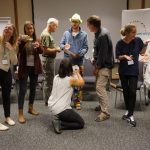As part of the ongoing project “Living Diversity in Germany and Israel – Challenges and Perspectives for Education and Youth Exchange” ConAct and the Israel Youth Exchange Authority offered a bilateral professional seminar in Leipzig from September 11 to 15, 2017. For more than 40 participants this seminar provided a comparative insight into established approaches of diversity-conscious education, which deal mainly with democracy education and anti-discrimination work.
In the three main sessions of the seminar, the participants were introduced intensively to the concepts of Social Justice, Betzavta / More Than One Democracy and Anti-Bias and had the chance to test selected methods of these approaches. Presented respectively by a trainer from Germany and Israel, the participants were able to reflect on similarities and differences between the approaches in both countries.
© All images by ConAct
Yaara Mizrachi (Psifas Educational Company) and Eike Totter (Social Justice Trainer) focused on the foundations of social exclusion (method: Tree of Injustice) in their introduction to Social Justice and on how describing can turn into discrimination. They moreover emphasized to become aware of one’s own attitude and to question the labeling of members of a group or societies (labeling of others).
The intensive methodical introduction to the Betzavta approach was conducted by Uki Maroshek-Klarman (Adam Institute for Democracy and Peace), the founder of the Betzavta approach in Israel, and Susanne Ulrich (Center for Applied Policy Research), who was responsible for the adaptation in Germany. Democratic negotiation processes in diverse societies are central here. Its methods aim to break stereotypes, suggest choices/options and understand decision-making processes. In order to arrive at just solutions, the approach involves the following: the influence of different power relations in groups/societies, the relationship between the individual and groups, and the resulting equality and inequality as well as the acceptance of differences (corresponds to diversity). The aim is, as Uki Maroshek-Klarman pointed out, “[to look] for a solution which is not about either or, but a social solution which leads to social equality.”
By applying many exercises, Žaklina Mamutovič and Nele Kontzi (Anti-Bias Network) from Germany and Sean Ed Michaely (Derekh Educational Center) from Israel presented the anti-bias approach. The method “Talking Chairs” used the setting of a speed dating to discuss social questions. Again, the approach challenged prejudices and focused on the self-perception of exclusion as well as on different social power relations. Anti-Bias aims at revealing patterns and structures of discrimination on an individual and institutional level, and to proactively change them. By using associations and brain storm on (social, religious, ethnical etc.) groups, which are part of or form the Israeli and German society, the participants then discussed the need to unite different groups (including marginalized groups) in order to meet their demands for social participation.
All approaches had the following in common: they acknowledge intersectional forms of discrimination and that differences and conflicts are necessary to arrive at decisions. Moreover, current power relations and social as well as cultural experiences influence the aforementioned issues. To achieve diversity-conscious education with young people depends on the individuals’ ability of a change of attitude, thus it depends on us as professionals to start with. Furthermore, the formation of (new) groups or the transformation of relationships within a society can be essential for achieving shared goals and acting inclusively rather than exclusively.
The project “Living Diversity in Germany and Israel” continues to compile common interests and issues in German-Israeli youth exchange. With the development of a training program, which will be presented in Mainz in November 2017, our project team aims to create new methodological bridges for a diversity-conscious youth education and anti-discrimination work between the two countries.


















